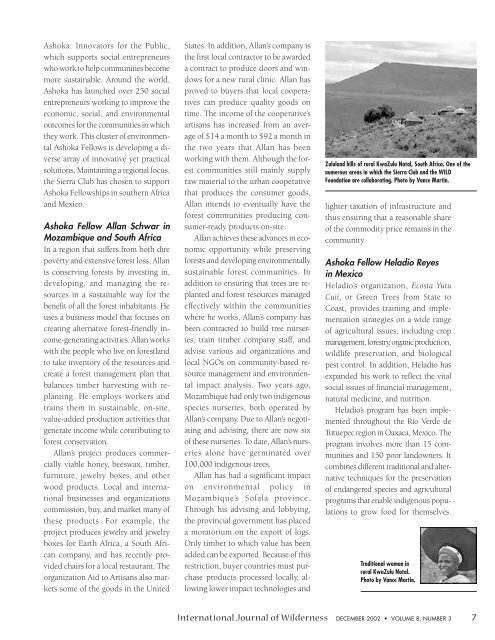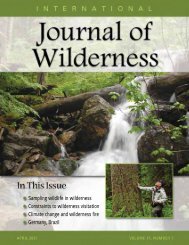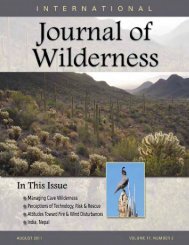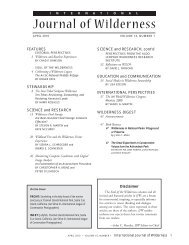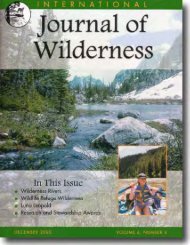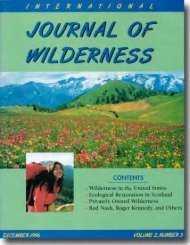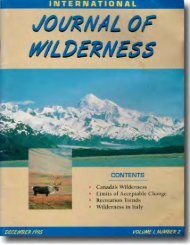Download full PDF - International Journal of Wilderness
Download full PDF - International Journal of Wilderness
Download full PDF - International Journal of Wilderness
Create successful ePaper yourself
Turn your PDF publications into a flip-book with our unique Google optimized e-Paper software.
Ashoka: Innovators for the Public,<br />
which supports social entrepreneurs<br />
who work to help communities become<br />
more sustainable. Around the world,<br />
Ashoka has launched over 250 social<br />
entrepreneurs working to improve the<br />
economic, social, and environmental<br />
outcomes for the communities in which<br />
they work. This cluster <strong>of</strong> environmental<br />
Ashoka Fellows is developing a diverse<br />
array <strong>of</strong> innovative yet practical<br />
solutions. Maintaining a regional focus,<br />
the Sierra Club has chosen to support<br />
Ashoka Fellowships in southern Africa<br />
and Mexico.<br />
Ashoka Fellow Allan Schwar in<br />
Mozambique and South Africa<br />
In a region that suffers from both dire<br />
poverty and extensive forest loss, Allan<br />
is conserving forests by investing in,<br />
developing, and managing the resources<br />
in a sustainable way for the<br />
benefit <strong>of</strong> all the forest inhabitants. He<br />
uses a business model that focuses on<br />
creating alternative forest-friendly income-generating<br />
activities. Allan works<br />
with the people who live on forestland<br />
to take inventory <strong>of</strong> the resources and<br />
create a forest management plan that<br />
balances timber harvesting with replanting.<br />
He employs workers and<br />
trains them in sustainable, on-site,<br />
value-added production activities that<br />
generate income while contributing to<br />
forest conservation.<br />
Allan’s project produces commercially<br />
viable honey, beeswax, timber,<br />
furniture, jewelry boxes, and other<br />
wood products. Local and international<br />
businesses and organizations<br />
commission, buy, and market many <strong>of</strong><br />
these products. For example, the<br />
project produces jewelry and jewelry<br />
boxes for Earth Africa, a South African<br />
company, and has recently provided<br />
chairs for a local restaurant. The<br />
organization Aid to Artisans also markets<br />
some <strong>of</strong> the goods in the United<br />
States. In addition, Allan’s company is<br />
the first local contractor to be awarded<br />
a contract to produce doors and windows<br />
for a new rural clinic. Allan has<br />
proved to buyers that local cooperatives<br />
can produce quality goods on<br />
time. The income <strong>of</strong> the cooperative’s<br />
artisans has increased from an average<br />
<strong>of</strong> $14 a month to $92 a month in<br />
the two years that Allan has been<br />
working with them. Although the forest<br />
communities still mainly supply<br />
raw material to the urban cooperative<br />
that produces the consumer goods,<br />
Allan intends to eventually have the<br />
forest communities producing consumer-ready<br />
products on-site.<br />
Allan achieves these advances in economic<br />
opportunity while preserving<br />
forests and developing environmentally<br />
sustainable forest communities. In<br />
addition to ensuring that trees are replanted<br />
and forest resources managed<br />
effectively within the communities<br />
where he works, Allan’s company has<br />
been contracted to build tree nurseries,<br />
train timber company staff, and<br />
advise various aid organizations and<br />
local NGOs on community-based resource<br />
management and environmental<br />
impact analysis. Two years ago,<br />
Mozambique had only two indigenous<br />
species nurseries, both operated by<br />
Allan’s company. Due to Allan’s negotiating<br />
and advising, there are now six<br />
<strong>of</strong> these nurseries. To date, Allan’s nurseries<br />
alone have germinated over<br />
100,000 indigenous trees.<br />
Allan has had a significant impact<br />
on environmental policy in<br />
Mozambique’s S<strong>of</strong>ala province.<br />
Through his advising and lobbying,<br />
the provincial government has placed<br />
a moratorium on the export <strong>of</strong> logs.<br />
Only timber to which value has been<br />
added can be exported. Because <strong>of</strong> this<br />
restriction, buyer countries must purchase<br />
products processed locally, allowing<br />
lower impact technologies and<br />
Zululand hills <strong>of</strong> rural KwaZulu Natal, South Africa. One <strong>of</strong> the<br />
numerous areas in which the Sierra Club and the WILD<br />
Foundation are collaborating. Photo by Vance Martin.<br />
lighter taxation <strong>of</strong> infrastructure and<br />
thus ensuring that a reasonable share<br />
<strong>of</strong> the commodity price remains in the<br />
community.<br />
Ashoka Fellow Heladio Reyes<br />
in Mexico<br />
Heladio’s organization, Ecosta Yutu<br />
Cuii, or Green Trees from State to<br />
Coast, provides training and implementation<br />
strategies on a wide range<br />
<strong>of</strong> agricultural issues, including crop<br />
management, forestry, organic production,<br />
wildlife preservation, and biological<br />
pest control. In addition, Heladio has<br />
expanded his work to reflect the vital<br />
social issues <strong>of</strong> financial management,<br />
natural medicine, and nutrition.<br />
Heladio’s program has been implemented<br />
throughout the Río Verde de<br />
Tutuepec region in Oaxaca, Mexico. The<br />
program involves more than 15 communities<br />
and 150 poor landowners. It<br />
combines different traditional and alternative<br />
techniques for the preservation<br />
<strong>of</strong> endangered species and agricultural<br />
programs that enable indigenous populations<br />
to grow food for themselves.<br />
Traditional woman in<br />
rural KwaZulu Natal.<br />
Photo by Vance Martin.<br />
<strong>International</strong> <strong>Journal</strong> <strong>of</strong> <strong>Wilderness</strong> DECEMBER 2002 • VOLUME 8, NUMBER 3 7


